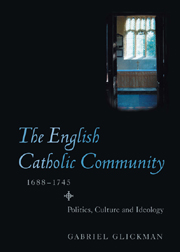Book contents
- Frontmatter
- Contents
- List of illustrations
- Acknowledgements
- Abbreviations
- Introduction
- 1 English Catholics and the Glorious Revolution of 1688
- 2 The making of the Catholic gentry in England and in exile
- 3 Conscience, politics and the exiled court: the creation of the Catholic Jacobite manifesto 1689–1718
- 4 Catholic politics in England 1688–1745
- 5 Unity, heresy and disillusionment: Christendom, Rome and the Catholic Jacobites
- 6 The English Catholic clergy and the creation of a Jacobite Church
- 7 The English Catholic reformers and the Jacobite diaspora
- Conclusion
- Appendices
- Bibliography
- Index
7 - The English Catholic reformers and the Jacobite diaspora
Published online by Cambridge University Press: 12 September 2012
- Frontmatter
- Contents
- List of illustrations
- Acknowledgements
- Abbreviations
- Introduction
- 1 English Catholics and the Glorious Revolution of 1688
- 2 The making of the Catholic gentry in England and in exile
- 3 Conscience, politics and the exiled court: the creation of the Catholic Jacobite manifesto 1689–1718
- 4 Catholic politics in England 1688–1745
- 5 Unity, heresy and disillusionment: Christendom, Rome and the Catholic Jacobites
- 6 The English Catholic clergy and the creation of a Jacobite Church
- 7 The English Catholic reformers and the Jacobite diaspora
- Conclusion
- Appendices
- Bibliography
- Index
Summary
In 1737, an obscure novel of ideas emerged from the London printing press. Acclaimed in The Gentleman's Magazine as ‘a beautiful fiction’, and ‘sublime allegory’, The Adventures of Signor Gaudentio di Lucca presented a new vision of man's state of nature, centred on the encounters of an explorer with a people ‘such as nations might be supposed to be, who had retained in their Purity … the original ideas of the arts, manners, religion and government of the first men in the infancy of the world’. The inhabitants of Mezzorania had survived their own voyage through exile, cast out of their native land by religious persecution. Resettled ‘in the midst of the Deserts of Africa’, they had constructed a society that was ‘the most humane and civilized I ever saw’, anchored in agrarian economics, a public meritocracy shaped by intellectual achievement, and the protection of benign, paternalist monarchy. Above all, they propounded toleration in affairs of the soul, being ‘not so inhuman as to put people to death, because they were of a different opinion from their own’. These ‘gentle and innocent children of nature’, had been set free to follow ‘the dictates of pure reason’ and ‘natural justice’, and their kingdom had ascended to a state of unity, bound not by coercion, but the love that made each man and woman view each other as part of the same family.
- Type
- Chapter
- Information
- The English Catholic Community, 1688–1745Politics, Culture and Ideology, pp. 221 - 251Publisher: Boydell & BrewerPrint publication year: 2009



